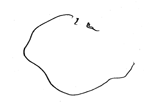Chief Complaint: Memory problems.
Present Illness: The patient is a 42 year old male with no significant prior illnesses, who is brought to the emergency room with a two week history of memory problems (per family member). He states that his problems started about two days prior to his visit to the emergency room, and reports only mild problems with forgetfulness. He works in the entertainment industry, and generally works the night shift. He is reported to have worked on the evening of admission, during which the patient was found wandering around the building; when confronted, he did not seem to realize what was happening. The patient was then brought to the emergency room. The patient himself denies any recollection of any of these events.
The family member accompanying the patient states that before the last two weeks, the patient showed no signs that anything was wrong. He did, however, appear more depressed recently. He did not appear to be as motivated and excited about life as was usual. He did not exhibit any aggressive behavior. His memory problems, which were not described with additional specific examples, seemed to begin with general disorientation and forgetfulness.
Past Medical History: None.
Past Surgical History: None.
Medications: None.
Family History: The patient's father was diagnosed with Alzheimer's disease (onset in the ninth decade). His mother and a paternal aunt and uncle had strokes. A sister was diagnosed with lupus.
Social History: The patient denied intravenous drug use, homosexual activity, blood transfusions, ethanol use, and tobacco use. He works in the entertainment industry.
Review of Systems: Positive only for memory problems. The patient denies headaches, blurred vision, speech problems, swallowing problems, numbness, or weakness of arms or legs. He denies nausea/vomiting, convulsions, fever/chills, chest pain, abdominal pain or discomfort, or diarrhea/constipation.
General: Thin, well-developed, well-nourished male in no apparent distress.
Vital Signs: Blood pressure 127/90 mmHg; Pulse 86/min, regular; Respirations: 18/min, regular and unlabored; Temperature 97.9 F (37 C).
HEENT: Neck supple, no lymphadenopathy. Oral and nasal passages clear. No carotid bruit heard.
Chest: Clear to auscultation bilaterally.
Cardiovascular: Regular rate and rhythm without murmurs/gallops/rubs; normal peripheral pulses.
Abdomen: Soft, non-tender, and non-distended, with bowel sounds present.
Extremities: No tattoos, injection tracts, rashes, or splinter hemorrhages observed.
Skin: No dyspigmented lesions; no rashes or bruises seen.

Marked difficulty drawing a clock.
Mental Status: The patient was alert, cooperative, and oriented to person and city. He stated that he was 36 years old, and worked as a travel agent (not his present occupation). A Mini-Mental Status Exam score was 7/30. He scored 3/3 on immediate recall, and had great difficulty reading a sentence (aloud and silently), many paraphasic errors on naming simple objects, fluent speech but mild comprehension difficulty for single-step commands, and inability to follow 3-step commands. He could not write a sentence. He also could not complete a drawing of intersecting polygons, failing to close the figures. He had marked difficulty drawing a clock (as retraced for illustration). On further mental status testing, the patient was able to demonstrate the ability to change sets when drawing (but his figures were not exact copies of the original), and could change sets on tasks involving alternating finger tapping. He did have difficulty with a unimanual sequencing test using the right hand.
Cranial Nerves: Visual acuity was intact, and visual fields were full to confrontation. Extraocular movements were intact without nystagmus. Sensation was intact in the V1-V3 distributions bilaterally. There was no paresis of muscles of facial expression. The uvula was midline, palate raised symmetrically, and gag response was intact bilaterally. Labial, lingual, and guttural sounds were intact. Sternocleidomastoid bulk and strength were intact bilaterally. Tongue was midline with no fibrillations.
Motor: Normal tone, normal bulk of all muscles tested; strength 5/5 in all major muscle groups.
Reflexes: Tendon reflexes were 2+ throughout, slightly brisk but with no spread. The jaw jerk (masseter stretch response) was enhanced, and a snout response was observed. No Hoffmann or Babinski responses were elicited.
Sensation: Intact to light touch, pinprick, vibration, proprioceptive testing. He had subtle signs of extinction on the right side using a test of double simultaneous stimulation of the left cheek and right arm.
Cerebellar: No abnormalities noted.
Gait: Normal heel, tandem, and toe walking.
Email comments: